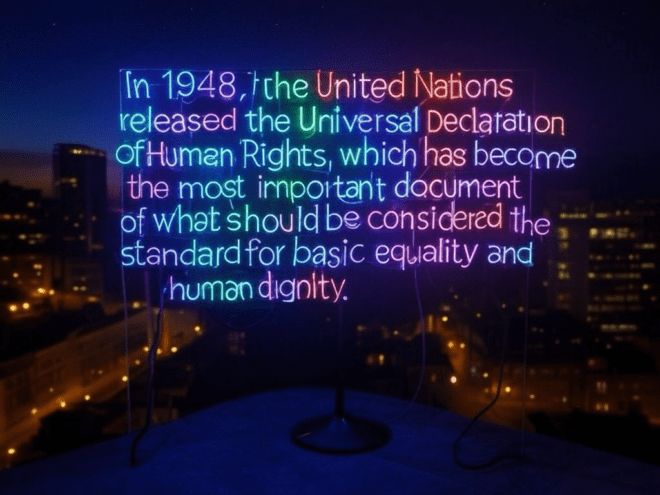
Abstract
The discourse surrounding human rights has evolved significantly since the inception of the Universal Declaration of Human Rights (UDHR) in 1948. This paper explores the reasons human rights matter, presenting ten compelling arguments that illustrate their importance. While the necessity of human rights is widely recognised, it is also crucial to consider counterarguments and challenges associated with their implementation. This paper aims to provide a balanced view, exploring both the benefits and the limitations of the human rights framework.
Introduction
The concept of human rights has gained unprecedented traction over the past few decades, influencing global policies and individual lives. The UDHR, adopted by the United Nations in 1948, serves as a foundational document that outlines the basic rights and freedoms to which all humans are entitled. But why do human rights matter so profoundly in contemporary society? This paper identifies ten compelling reasons for their significance, while also acknowledging counterarguments and challenges that accompany the human rights discourse.
Human Rights Ensure Access to Basic Necessities
One of the most fundamental arguments for the importance of human rights is their role in guaranteeing access to essential resources such as food, water, clothing, and shelter. By framing these necessities as rights, activists and organisations can advocate for policies that ensure equitable access for all. However, critics argue that the recognition of these rights does not always translate into effective action. For instance, despite the acknowledgment of the right to food, millions continue to suffer from hunger and malnutrition due to systemic issues like poverty and inequality. Thus, while the framework of human rights is essential, it must be accompanied by practical measures to ensure its effectiveness.
Safeguarding Vulnerable Groups
The UDHR emerged as a response to the atrocities committed during World War II, particularly against marginalised groups. Human rights serve as a safeguard for these vulnerable populations, offering protection against mistreatment and exploitation. Organisations like Amnesty International and Human Rights Watch work tirelessly to uphold the rights of these groups. Nevertheless, some critics argue that the focus on individual rights can sometimes overshadow collective rights, particularly in indigenous communities where communal rights are vital for cultural preservation. Thus, while human rights are essential for protecting vulnerable individuals, a more nuanced approach that includes collective rights may be necessary.
Empowering Individuals Against Corruption
Human rights empower individuals to challenge corruption and injustice, providing them with the tools to demand accountability from those in power. The freedom to assemble and express dissent is vital for a functioning democracy. However, the effectiveness of these rights can be limited in authoritarian regimes, where dissent is often met with repression. For example, activists in countries like Belarus and Iran have faced severe consequences for exercising their rights. This highlights the need for international support and pressure to uphold human rights in such contexts, illustrating that while human rights are a powerful tool for empowerment, their realisation is often contingent on the political environment.
Promoting Freedom of Speech and Expression
The right to free speech is fundamental to democracy and personal autonomy. It allows for open debate and the exchange of ideas, fostering a healthy public discourse. However, the right to free speech can also lead to the spread of hate speech and misinformation. Critics argue that unrestricted freedom of expression can undermine social cohesion and lead to violence. For instance, social media platforms have become battlegrounds for hate speech, raising questions about the balance between protecting free speech and preventing harm. Therefore, while freedom of expression is a cornerstone of human rights, it necessitates a careful approach to ensure that it does not infringe upon the rights of others.
Religious Freedom
Human rights enshrine the freedom of religion, allowing individuals to practice their beliefs without fear of persecution. This principle is particularly important in a world where religious oppression has led to violence and conflict. However, the application of religious freedom can be contentious, especially in cases where religious practices conflict with other rights, such as gender equality. For example, some argue that certain religious practices may perpetuate discrimination against women. Thus, while religious freedom is a fundamental human right, it must be balanced with other rights to ensure a just society.
Protecting the Freedom to Love
The right to love freely is a vital aspect of human dignity, allowing individuals to choose their partners without fear of coercion or persecution. This right has gained increasing recognition, particularly for LGBTQ individuals. However, despite significant progress in many countries, there are still places where such rights are not upheld, leading to discrimination and violence. The ongoing struggle for LGBTQ rights highlights the need for continued advocacy and legal protections. Thus, while the right to love is essential, its realisation is often hindered by societal norms and legal frameworks that lag behind.
Encouraging Equitable Work Opportunities
Human rights advocate for equitable work opportunities, ensuring that individuals can earn a livelihood without facing discrimination. This is crucial for personal development and societal progress. However, the reality of workplace discrimination and exploitation remains pervasive, particularly for marginalised groups. Critics argue that merely recognising the right to work is insufficient; systemic changes are necessary to dismantle barriers that prevent equal opportunities. Therefore, while human rights provide a framework for equitable treatment in the workplace, effective implementation requires comprehensive reforms.
Ensuring Access to Education
Education is a transformative right that empowers individuals and communities. Recognising education as a human right compels governments to provide necessary resources and opportunities. However, access to quality education remains unequal, particularly in low-income regions. Critics argue that simply framing education as a right does not address the underlying issues of funding and infrastructure that hinder access. Thus, while the recognition of education as a human right is essential, it must be accompanied by concrete actions to ensure its realisation for all.
Protecting the Environment
The relationship between human rights and environmental protection has gained attention in recent years, particularly in the context of climate change. Access to clean air, water, and a healthy environment is increasingly recognised as a human right. However, the prioritisation of economic growth over environmental protection often leads to violations of these rights. Critics argue that without a concerted effort to integrate environmental sustainability into human rights frameworks, the future of both human rights and the planet is at risk. Therefore, while recognising environmental rights is crucial, it must be part of a broader strategy that prioritises sustainability.
Holding Governments Accountable
The UDHR established a universal standard for human rights, providing a framework for holding governments accountable for violations. However, enforcement mechanisms are often weak, and violations frequently go unpunished. Critics argue that international human rights law lacks teeth, making it difficult to effect meaningful change. For instance, despite widespread recognition of human rights, violations persist in many countries without repercussions. This highlights the need for stronger international cooperation and mechanisms to ensure accountability. Thus, while the UDHR is a critical tool for promoting human rights, its effectiveness depends on the commitment of the international community to uphold these standards.
Conclusion
The significance of human rights cannot be overstated; they provide a framework for ensuring dignity, equality, and justice for all individuals. However, the realisation of these rights is fraught with challenges and complexities. While the ten reasons outlined in this paper illustrate the importance of human rights, it is essential to acknowledge the counterarguments and limitations that accompany them. A comprehensive approach to human rights must consider these challenges, advocating for systemic changes that promote genuine equality and justice. As we move forward, the continued evolution of the human rights discourse will be vital in addressing the pressing issues facing our global society.

